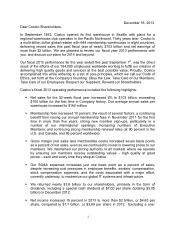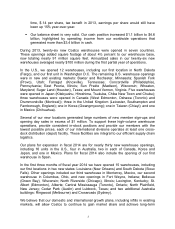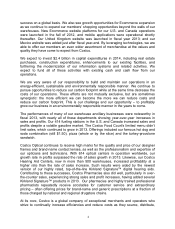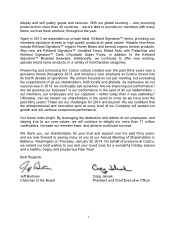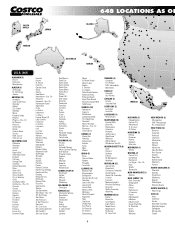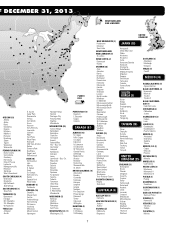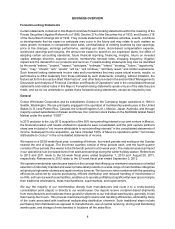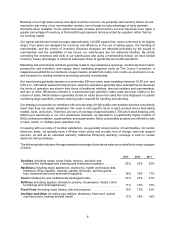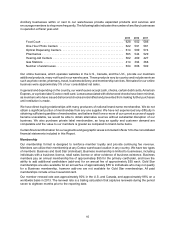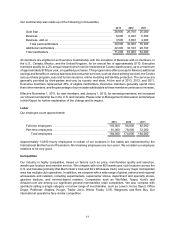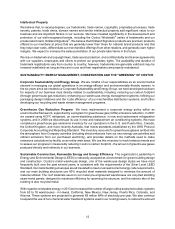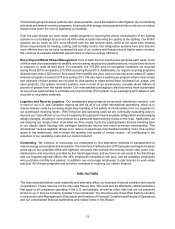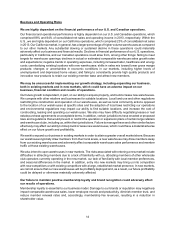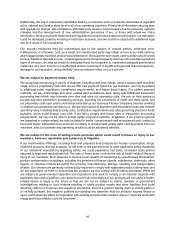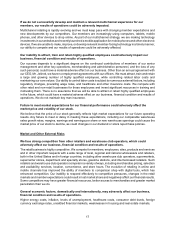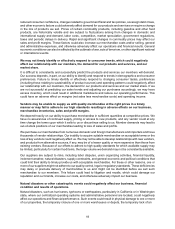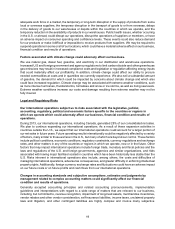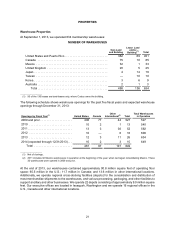Costco 2013 Annual Report Download - page 14
Download and view the complete annual report
Please find page 14 of the 2013 Costco annual report below. You can navigate through the pages in the report by either clicking on the pages listed below, or by using the keyword search tool below to find specific information within the annual report.12
Intellectual Property
We believe that, to varying degrees, our trademarks, trade names, copyrights, proprietary processes, trade
secrets, patents, trade dress, domain names and similar intellectual property add significant value to our
business and are important factors in our success. We have invested significantly in the development and
protection of our well-recognized brands, including the Costco Wholesale® series of trademarks and our
private label brand, Kirkland Signature®. We believe that Kirkland Signature products are premium products
offered to our members at prices that are generally lower than those for national brand products and that
they help lower costs, differentiate our merchandise offerings from other retailers, and generally earn higher
margins. We expect to increase the sales penetration of our private label items in the future.
We rely on trademark and copyright laws, trade secret protection, and confidentiality and license agreements
with our suppliers, employees and others to protect our proprietary rights. The availability and duration of
trademark registrations vary from country to country; however, trademarks are generally valid and may be
renewed indefinitely as long as they are in use and their registrations are properly maintained.
SUSTAINABILITY: ENERGY MANAGEMENT, CONSERVATION AND THE "GREENING" OF COSTCO
Corporate Sustainability and Energy Group We are mindful of our responsibilities as an environmental
steward in managing our global operations in an energy-efficient and environmentally-friendly manner. In
the six years since we created our Corporate Sustainability and Energy Group, we have developed solutions
for aspects of our business most directly related to sustainability, including: reducing our carbon footprint
(through greenhouse gas reduction); enhancing our warehouse energy management systems; refining our
packaging design initiatives and the “cube efficiency” of our merchandise distribution systems; and further
developing our recycling and waste stream management programs.
Greenhouse Gas Reduction Program We have implemented a corporate energy policy within an
environmental framework, supported by a program for greenhouse gas (GHG) emissions reduction. In 2007
we ceased using HCFC refrigerant, an ozone-depleting substance, in new and replacement refrigeration
systems, and in 2008 we discontinued its use in new and replacement air conditioning systems. We have
completed a greenhouse gas emissions inventory for our operations in the U.S. and Puerto Rico, Canada,
the United Kingdom, and more recently Australia, that meets standards established by the GHG Protocol
Corporate Accounting and Reporting Standard. The inventory accounts for greenhouse gasses emitted into
the atmosphere from Company activities (including direct emissions from our own energy-use activities and
indirect emissions from our purchased electricity), and provides details on the methods used to make
emissions calculations by facility on an entity-wide basis. We use this inventory to track emission trends and
to assess our progress in measurably reducing Costco’s carbon footprint - the amount of greenhouse gases
produced directly and indirectly in our business.
Sustainable Construction, Renewable Energy and Energy Efficiency The organization Leadership in
Energy and Environmental Design (LEED) is nationally accepted as a benchmark for green building design
and construction. Costco’s metal warehouse design, one of the warehouse design styles we have most
frequently built over the past several years, is consistent with the requirements of the Silver Level LEED
Standard. Our metal building envelopes are all insulated to meet or exceed current energy code requirements,
and our main building structures use 80% recycled steel materials designed to minimize the amount of
material utilized. The roof materials used on our metal pre-engineered warehouses are recycled standing
seam metal panels, designed to maximize efficiency for spanning the structure; and the exterior skin of the
building is also recycled metal.
With regard to renewable energy, in 2013 we increased the number of large rooftop solar photovoltaic systems
from 63 to 78 warehouses - in Hawaii, California, New Mexico, New Jersey, Puerto Rico, Colorado, and
Arizona. These systems are projected to generate 69 million kWh of electricity per year. We also continue
to expand the use of non-chemical water treatment systems used in our cooling towers, to reduce the amount


